 Most people have probably heard of Digg by now.
It's one of the unofficial poster children of Web 2.0, and was one of the first social news sites to come out.
It gets millions of visitors every month (Compete says about 43 million in October 2009), and those visitors vote on thousands of stories every day.
In this article you can learn about how Digg came to be from its humble beginnings to the massive popularity it has now as well as the controversies that have surrounded it.
In case you're unfamiliar with how Digg works, here's a very brief overview:
Users can submit stories from anywhere online, giving each submission a headline and synopsis to help other Digg users determine if a story is worth their time.
After a story is submitted, other users can "Digg" (vote up) or "Bury" (vote down) that story. If a story gets a certain number of Diggs within a specified period of time, it might make the popular section within its category or even the home page.
If it gets buried enough times, it will disappear from the site's main feed (and is only visible if users specifically include buried stories in their searches).
The exact algorithm that determines whether a story makes the popular sections or gets buried is kept a secret, and has been changed and refined numerous times throughout Digg's history.
Most people have probably heard of Digg by now.
It's one of the unofficial poster children of Web 2.0, and was one of the first social news sites to come out.
It gets millions of visitors every month (Compete says about 43 million in October 2009), and those visitors vote on thousands of stories every day.
In this article you can learn about how Digg came to be from its humble beginnings to the massive popularity it has now as well as the controversies that have surrounded it.
In case you're unfamiliar with how Digg works, here's a very brief overview:
Users can submit stories from anywhere online, giving each submission a headline and synopsis to help other Digg users determine if a story is worth their time.
After a story is submitted, other users can "Digg" (vote up) or "Bury" (vote down) that story. If a story gets a certain number of Diggs within a specified period of time, it might make the popular section within its category or even the home page.
If it gets buried enough times, it will disappear from the site's main feed (and is only visible if users specifically include buried stories in their searches).
The exact algorithm that determines whether a story makes the popular sections or gets buried is kept a secret, and has been changed and refined numerous times throughout Digg's history.
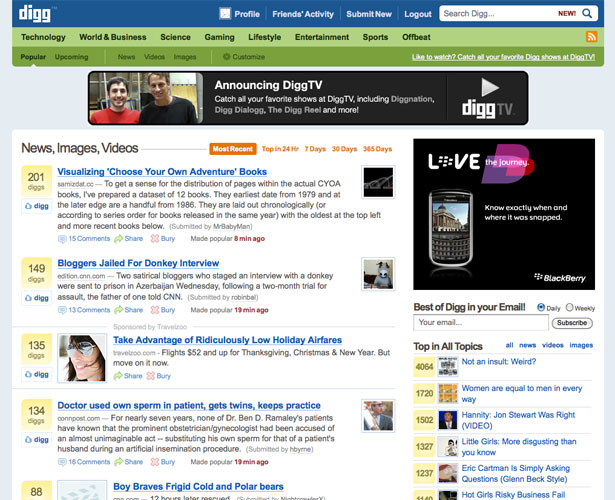
Early Development
Digg got started in late 2004 as an experiment by Kevin Rose, Jay Adelson, Ron Gorodetzky and Owen Byrne. The name "Diggnation" was originally proposed, but the group decided the name was too long, and shortened it to "Digg" (Dig.com had already been registered by the Walt Disney Internet Group, hence the double "G"). Digg was similar to social bookmarking sites, but had one fundamental difference. While sites like Delicious allowed users to bookmark sites and share them with others, they were aimed at saving sites you'd want to return to again and again. Digg, on the other hand, focused on saving pages with temporary value: things like news stories and blog posts. Digg was the first true social news site. The first ten stories on Digg were primarily tech-focused (Blog Box Applications, a CSS cheatsheet, and a torrent search engine were among them), though there was also a post about a buy-one-get-one-free deal at Jamba Juice. The tenth story seems to have disappeared; it's been speculated it was a spam post and was removed.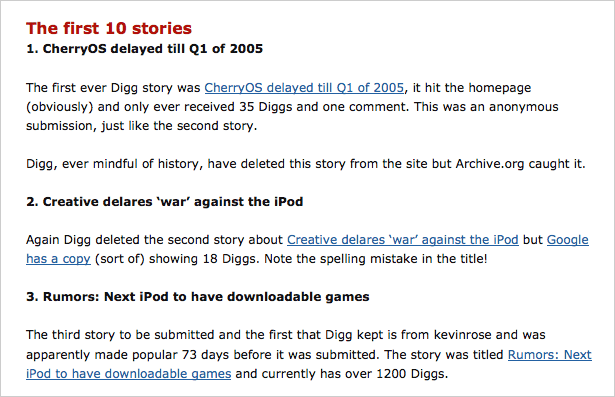 Within 18 months, Digg grew to more than 800,000 daily visitors. But they'd also started receiving some negative attention during that time. One early allegation of abuse was over Digg users using the site to spread rumors of a Google acquisition of Sun, which led to artificial inflation of Sun's stock prices.
Within 18 months, Digg grew to more than 800,000 daily visitors. But they'd also started receiving some negative attention during that time. One early allegation of abuse was over Digg users using the site to spread rumors of a Google acquisition of Sun, which led to artificial inflation of Sun's stock prices.
Initial Development
The initial site launched didn't have support for many of the things we associate with Digg today. Basically, the original Digg let users sign up for an account, submit content, and then either vote it up (Digg it) or vote it down (Bury it).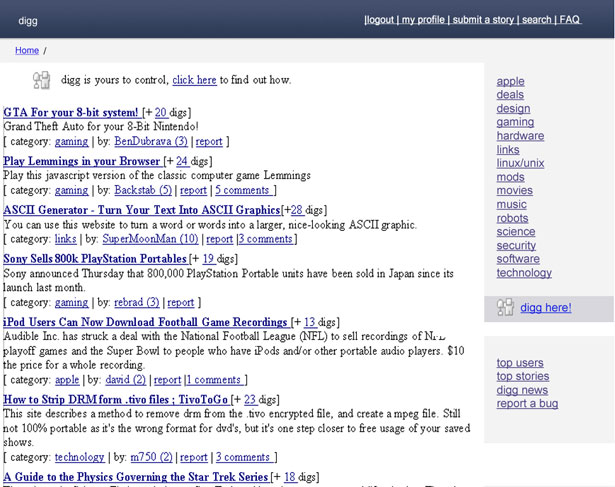 According to an interview with Mother Jones in 2007, Kevin Rose worried for the first six months or so about the content that would make it to the home page.
It was the first time a site had allowed users to become editors and determine which content was likely to be seen. But it ultimately turned out a success, with most of the content on the front page during those first few months being interesting, relevant news.
Digg 2.0
According to an interview with Mother Jones in 2007, Kevin Rose worried for the first six months or so about the content that would make it to the home page.
It was the first time a site had allowed users to become editors and determine which content was likely to be seen. But it ultimately turned out a success, with most of the content on the front page during those first few months being interesting, relevant news.
Digg 2.0The second iteration of Digg added many of the features we associate with the site today. It was launched in July of 2005, only about 8 months after the original site was launched. The ability to add friends was included, as well as a site redesign. They also removed the redirect to a "success" page after users dugg a story. Digg 3.0
Roughly one year after Digg 2.0 was released, Digg 3.0 came out. The new version included specific categories for Entertainment, Gaming, Videos, World & Business, Science, and Technology, along with an option to view all the categories at once.
Diggnation
Diggnation is the weekly video podcast show Kevin Rose and Alex Albrecht produce. Its primary focus is to talk about some of Digg's top stories for the week among other things. The show airs online every Wednesday at 6PM. There are an estimated 200,000 regular subscribers to the show. In addition the website distribution, the show is also available through iTunes and TiVo, and is available on-demand on Virgin America airlines.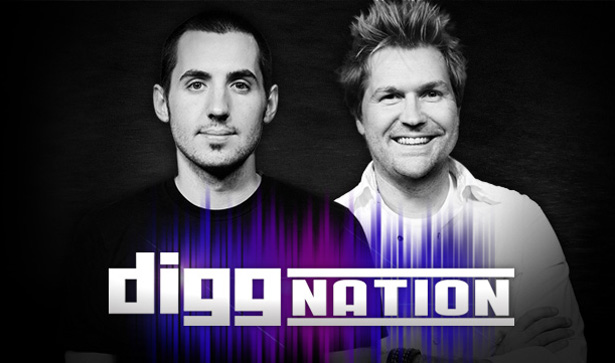 Diggnation has received a number of awards, including the 2006 Podcast Award for best technology podcast, the Best in 2007 Podcast from iTunes, and a Webby Award in 2008 for People's Voice Winner for the Technology in Online Film and Video.
Diggnation is produced by Revision3, which was founded by Jay Adelson, Kevin Rose, Dan Huard, Ron Gorodetzky, and David Prager and is now led by Jim Louderback. Diggnation was their first show, but they've grown to include more than a dozen other shows.
Diggnation has received a number of awards, including the 2006 Podcast Award for best technology podcast, the Best in 2007 Podcast from iTunes, and a Webby Award in 2008 for People's Voice Winner for the Technology in Online Film and Video.
Diggnation is produced by Revision3, which was founded by Jay Adelson, Kevin Rose, Dan Huard, Ron Gorodetzky, and David Prager and is now led by Jim Louderback. Diggnation was their first show, but they've grown to include more than a dozen other shows.
Advertising and Revenue
The original Digg site didn't include any advertising. But as the site grew, the developers quickly added means of generating revenue. They started out with Google AdSense, and eventually moved on to banner ads. But in the summer of 2009, the moved on to a different form of advertising: sponsored posts showing up within Digg's regular news feed. What really set this apart, though, was that these sponsored posts also included "Digg" and "Bury" buttons, like their regular content.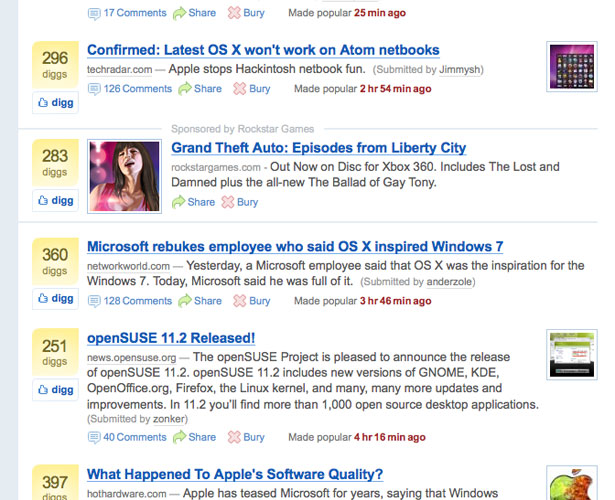 This was a pretty revolutionary new form of advertising. It allows users to vote up or down the ads they want to see, and according to a quote in the Bits blog of the New York Times from Mike Maser, Digg's chief strategy officer, the response from users has been largely positive.
Considering the history Digg has had with user reactions to changes they've made, implementing this kind of advertising strategy was risky to say the least. But so far it looks like it's paid off—Digg has tripled their ad revenue forecast for the year.
It's also providing valuable feedback to companies running ads, as they can see exactly what Digg users think of their ads based on how they're voted up or down. This means future marketing efforts can be better targeted toward the site's visitors.
This was a pretty revolutionary new form of advertising. It allows users to vote up or down the ads they want to see, and according to a quote in the Bits blog of the New York Times from Mike Maser, Digg's chief strategy officer, the response from users has been largely positive.
Considering the history Digg has had with user reactions to changes they've made, implementing this kind of advertising strategy was risky to say the least. But so far it looks like it's paid off—Digg has tripled their ad revenue forecast for the year.
It's also providing valuable feedback to companies running ads, as they can see exactly what Digg users think of their ads based on how they're voted up or down. This means future marketing efforts can be better targeted toward the site's visitors.
The Digg Effect
Digg has grown to such large visitor numbers that websites who make the front page often have a hard time staying up under the onslaught of traffic (if they're unprepared for it, that is). This is known as the "Digg effect", though sometimes this is a result of the story being featured on multiple bookmarking and news sites simultaneously. The Digg effect can send thousands or tens of thousands of visitors to a site within a matter of a couple hours, and has been known to crash sites on a fairly regular basis. Numerous articles have been written (here, here, and here for starters) about the Digg Effect, what it really does, and how to prepare for it so your site doesn't slow down too much or crash.Controversies Surrounding Digg
Digg has been surrounded in controversy practically since its launch. Everything from the "bury" option to the fact that it's a user-moderated site have come under fire from critics. One of the most common criticisms regards Digg's algorithm (and changes to it). Digg has always kept its algorithm a secret, which has led many to believe that Digg's creators often have a hand in censoring or burying particular posts they don't agree with (or, alternatively, of bumping posts they particularly like). Digg has always maintained that whether the content makes the front page or is buried is entirely up to the users, and that the developers and programmers have no hand in it. Other controversies include the use of Digg as a marketing tool by entrepreneurs. While some companies become legitimate parts of the Digg community, others do little more than submit self-promotional posts in hopes of getting extra traffic (those posts are generally either buried directly or just never gain any traction). Here are a few more controversies surrounding Digg:Digg Revolt
So far, there have been two major Digg uprisings, one in 2007 and one in 2008. The first one, in May 2007, revolved around the AACS encryption key used on HD DVDs and Blu-ray Disc. On May 1, an article made it to Digg's front page that offered up the encryption key for removing the digital rights management on HD DVDs and Blu-ray Discs. Digg's legal team recommended the story be taken down. Digg did so, and banned a number of users who had submitted the story. But Digg users didn't take this action lightly. Rather than let the issue drop, more and more Digg users started reposting the encryption key, both in comments and new posts. Soon there were hundreds of stories appearing on the site, and Digg backed down. Digg's official statement declared, "...you've made it clear. You'd rather see Digg go down fighting than bow down to a bigger company." They reversed their policy of deleting posts that included the encryption key and said they would deal with whatever consequences that brought. The second major revolt happened when a change to Digg's algorithm was announced. Many Digg "power users" felt the new algorithm would give them less power in influencing the content that made it to the front page. A temporary boycott was called, with some even proposing the users move over to a different site entirely. Digg was also called out for being unresponsive to suggestions posed by users, and a general lack of communication. Numerous other grievances were cited in letters to Digg, including a lack of transparency and Digg's purported "auto-bury" list. Before the revolt, Digg put up a blog post explaining that the changes were being made to create a more level playing field for all Digg users, and to give everyone a fair chance of having their submission make the front page.Shout Feature Removed
In May of 2009, Digg removed the "Shout" feature from the site. Shouts were a form of internal communication on the site, and some believed they were used by top users to gain an advantage when promoting their content. While some users were upset by the move, others welcomed it. Digg replaced the Shout feature by making it easier for users to share and promote their posts through Twitter and Facebook. While this has moved some interaction off Digg's site, it may also bring in new users, who see Digg links being passed along on other sites.Digg Bar
The Digg Bar was released in early April 2009 and immediately came under fire for multiple reasons. The Digg Bar, for those unfamiliar with it, frames the original webpage rather than redirecting to the page specifically. One major reason this has been criticized is that it can have a negative effect on a site's page rank, because the shortened URLs the bar uses don't give any credit to the original site (some CMSs and blogs have blocked the Digg bar or set it to redirect to the original page).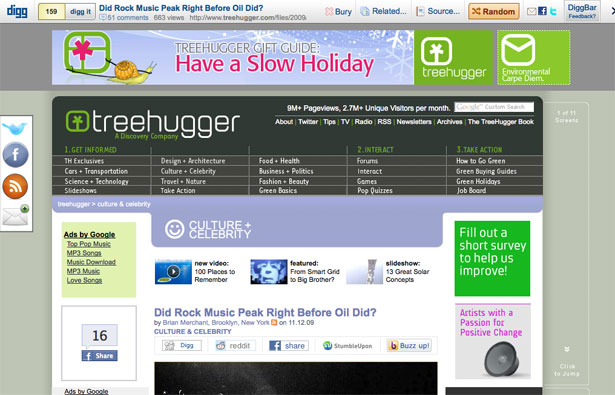
ForeverGeek-Gate
In April 2006, ForeverGeek called Digg out on a pattern of digging by what has been deemed the "Digg Army". Basically, he noticed a pattern of digging by certain users, and that some stories that made the home page had been dugg by a number of the exact same Diggers. In fact, of the two stories he compared, both were from A List Apart, and were originally submitted by the same user. Of the first 24 users who dugg the story, 22 of them were the same (the first 16 were completely identical, right down to the order in which they dugg the stories). Only two users were different on each story. Adding to the speculation surrounding this was the fact that Kevin Rose was included in the 22 users who dugg both stories. A number of high-profile blogs (including BoingBoing and Slashdot) reported ForeverGeek's findings, many of which verified the claims. And some more traditional media sources also weighed in (including The Inquirer). And not long after that, ForeverGeek was banned from Digg (it became impossible to submit any stories from the site). While Digg maintains that ForeverGeek was banned because they were suspected of using multiple accounts to vote up their own stories, there are a number of reports of other users who submitted similar stories who were also banned. Eventually, ForeverGeek was un-banned. But reportedly a number of users in the "Digg Army" disappeared from the site, too.The Bury Brigade
It has long been theorized that there is a network of Diggers who act as a unofficial censors to content posted to Digg that does not fit with their ideology. This network is often referred to as the "Bury Brigade". In early 2007, a user named David LeMieux figured out how to use the site's Digg Spy tool to highlight which users were burying stories and why they were doing so. He was able to gather information on more than 1700 buries during a two hour period. Digg has long kept information about buries shrouded in secrecy, so the data gathered by LeMieux is some of the only such data available. The story itself was then buried on Digg, and one user who submitted a duplicate story even found themselves banned. Another user, Muhammad Saleem, posted some raw data and his analysis on the Bury Brigade in February 2007. He came to the conclusion that it proved the existence of a Bury Brigade, though other users doubted that conclusion (see the comments to the original article for specifics). Both the Bury Brigade and the users trying to uncover the truth behind it seem to be grassroots-based and have no central leader or formal organization. The Bury Brigade gained enough attention there was an official response from Kevin Rose posted on the Digg blog regarding the information released about it. Basically, Rose stated that the data gathered through using the Digg Spy was only partial data, and shouldn't be considered representative of what's happening across the entire Digg community. Whether a bury brigade actually exists or whether the stories purportedly buried by them are just a reflection of the bias of the majority of Digg users (or just the most involved) is still up in the air.The Top User List
Up until 2007, Digg had a public list of who the top Diggers were. These were the most influential Digg users. Stories they submitted and dugg got to the front page more often than those by other users. These top users enjoyed a position of power within the Digg community. So much so, in fact, that some were offered monetary or other compensation for digging sponsored stories. And that's where the controversy started. If powerful Digg users were being paid to digg stories, it would change the dynamics of the entire site. If a sponsor paid ten or twenty of the top users to vote for a story, it could spur other users to vote for it, and the likelihood of it making the front page would drastically increase. The whole thing was at odds with what the Digg community was supposed to be all about (democratic, user control of content). Those on the list were also accused of manipulating Digg content, paid or otherwise. So, Digg took action. They stopped publishing the list of top Digg users. This resulted in outrage from some Digg users (mostly those who appeared on the Top Diggers list), who enjoyed the notoriety they gained from being on the list. Some viewed it as removing any reward for submitting content, and speculated it could lead to decreased participation among some members. Whether the removal of the list had any lasting impact on Digg is unknown (it didn't appear to).The Existence of Auto-Bury
There has been ongoing speculation over the existence of an auto-bury algorithm or an internal bury system. A few bloggers have published anecdotal evidence of some kind of internal bury mechanism, though Digg has maintained that there is no such system. While some of the evidence against Digg seems pretty compelling, there's nothing that proves the existence of any kind of auto-bury system. And since Digg's algorithm is a closely-gaurded secret, it's unlikely we'll find out the truth behind this any time soon. A Brief History of Digg Controversy has more information about controversies surrounding Digg.Digg Events
Digg founders regularly participate in tech-related events and host Digg meetups. In 2008 they hosted the Bigg Digg Shindigg at SXSW. Their first meetup was held in San Francisco in 2008, and other meetups have followed in Chicago, Los Angeles, Seattle and New York. They hosted a second Bigg Digg Shindigg at SXSW in 2009 that included a live Diggnation show and live music. It was attended by more than 2000 people. In addition to live events, Digg also hosts online townhall-style meetings. They've held seven to date (you can watch all of them on their website). These townhall webcasts are hosted by Jay Adelson and Kevin Rose, and included information on new features, answers to questions posed by community members, and site-related news.The Future of Digg
Digg has reportedly been trying to sell itself for a number of years now, and was even courted by Google at one point (the sale fell through at the last minute). Kevin Rose was quoted in an interview in Mother Jones saying that he'd be happy to continue running Digg without being sold or going public. A survey leaked in September 2009 gave some hints about the possible future direction of Digg. It sought user input on things like a customized homepage that shows popular stories that might appeal to specific users based on their interests and vertical channels that would let users discover popular content in specific niche areas. Other features mentioned included anonymous Digging (without requiring a user account), a "save to read later" function that lets you flag stories to look at later, and Digg groups that let users form groups to share content. One of the more interesting features mentioned is a "Digg Breaking News" section, which could be targeted at taking some of Twitter's market share when it comes to breaking news (which Twitter has become very adept at doing).Written exclusively for WDD by Cameron Chapman.
What do you think of Digg and the controversies surrounding it?
WDD Staff
WDD staff are proud to be able to bring you this daily blog about web design and development. If there's something you think we should be talking about let us know @DesignerDepot.
Read Next
3 Essential Design Trends, May 2024
Integrated navigation elements, interactive typography, and digital overprints are three website design trends making…
How to Write World-Beating Web Content
Writing for the web is different from all other formats. We typically do not read to any real depth on the web; we…
By Louise North
20 Best New Websites, April 2024
Welcome to our sites of the month for April. With some websites, the details make all the difference, while in others,…
Exciting New Tools for Designers, April 2024
Welcome to our April tools collection. There are no practical jokes here, just practical gadgets, services, and apps to…
How Web Designers Can Stay Relevant in the Age of AI
The digital landscape is evolving rapidly. With the advent of AI, every sector is witnessing a revolution, including…
By Louise North
14 Top UX Tools for Designers in 2024
User Experience (UX) is one of the most important fields of design, so it should come as no surprise that there are a…
By Simon Sterne
What Negative Effects Does a Bad Website Design Have On My Business?
Consumer expectations for a responsive, immersive, and visually appealing website experience have never been higher. In…
10+ Best Resources & Tools for Web Designers (2024 update)
Is searching for the best web design tools to suit your needs akin to having a recurring bad dream? Does each…
By WDD Staff
3 Essential Design Trends, April 2024
Ready to jump into some amazing new design ideas for Spring? Our roundup has everything from UX to color trends…
How to Plan Your First Successful Website
Planning a new website can be exciting and — if you’re anything like me — a little daunting. Whether you’re an…
By Simon Sterne
15 Best New Fonts, March 2024
Welcome to March’s edition of our roundup of the best new fonts for designers. This month’s compilation includes…
By Ben Moss
LimeWire Developer APIs Herald a New Era of AI Integration
Generative AI is a fascinating technology. Far from the design killer some people feared, it is an empowering and…
By WDD Staff

















